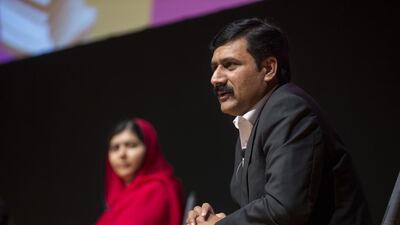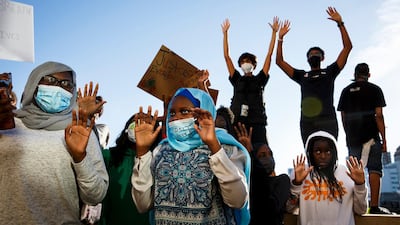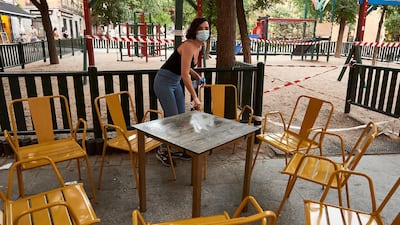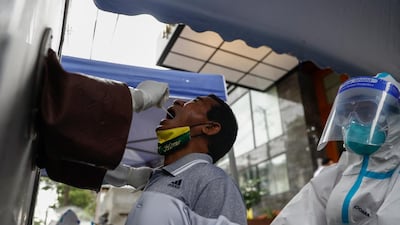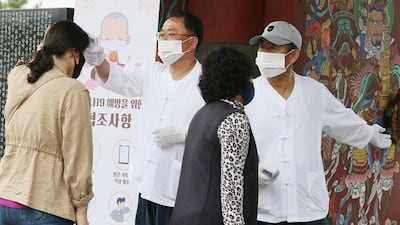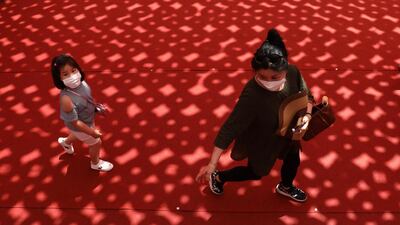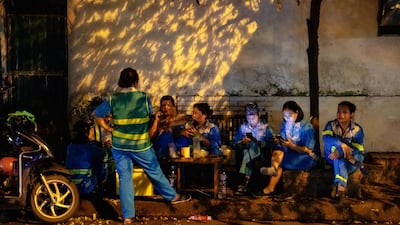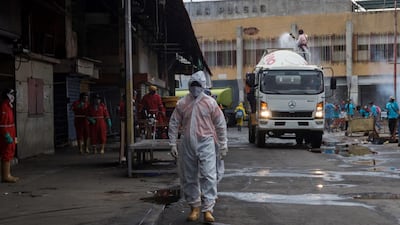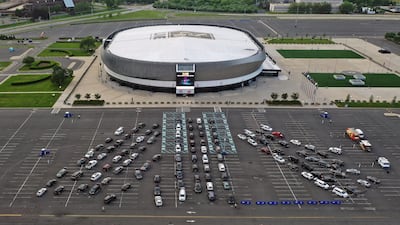The teacher father of Malala Yousafzai, the Pakistani education activist who survived a murder attempt by the Taliban when she was 15, said on Saturday that the coronavirus pandemic offers a chance to reflect and improve education for girls.
"We need to learn from Covid-19, it needs to give us an opportunity to reflect. This teaches us how the world leaders should spend money and should invest," Ziauddin Yousafzai, told the T4 Conference, an online teaching convention bringing together 100,000 teachers from at least 67 countries.
The virtual forum sought to make sense of so-called ‘new normal’ in schools when they operate amid a global pandemic.
“There are 259 million children and youth who are not in schools right now,” said Mr Yousafzai.
“The reason isn't because of Covid-19, it is because they don’t have enough schools, they don’t have enough teachers, they don't have enough facilities.”
He decried the “ugly social taboos” and “patriarchal norms” that mean that hundreds of millions of girls have no access to education.
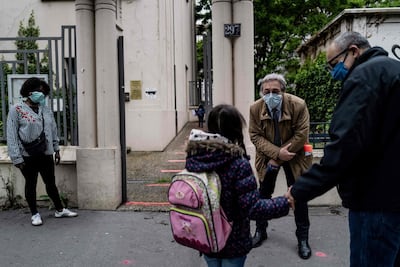
“There are 129 million girls right now are not in schools. And again, the reason is not Covid-19 or a pandemic. These girls are not in school because of the patriarchal governments - governments that invest less in girls’ education,” he said.
He read out a message to the conference from his daughter Malala, 22, who is studying in her final year at Oxford University in the UK.
The letter called governments to keep commitments to students by helping them connect to more remote learning opportunities and ensuring girls can re-enrol when schools are open again. She also urged countries to prioritise education in their coronavirus responses.
With many children not returning to school until September due to the pandemic, governments need to encourage more collaboration and community engagement to help teachers restart classes in a post-coronavirus world, another leading educator said during the conference.
"We are in a transition phase for many countries, leaders, and ministries of education all over the world. Most of the time they've got it right and most of the time they've also got it wrong," Andria Zafirakou, the Winner of the 2018 Global Teacher Prize, said.
Vikas Pota, the host of the T4 event, is the former chief executive of the Varkey Foundation, a global charity that focuses on improving standards of education for underprivileged children. Mr Pota set up the annual $1 million Global Teacher Prize.
“What we really desperately need from you [ministers] is to think about the future. Be brave. Think about 10 years in advance. What do our students need? What do employers want them to have so we know what to be teaching them,” Ms Zafirkou added.

“Give us the opportunities to lead our communities. Give us the opportunities to really do what we know is best for our communities because we can and we've been doing that as well.”
Ms Zafirakou, an Arts and Textiles teacher works at Alperton Community School in northwest London, said that safety of teachers and pupils is paramount when holding classes in the new normal. She called for teachers to all be provided with adequate personal protective equipment so they can carry out their jobs safely.
The British teacher said some schools have been showing leadership by delivering learning devices and food to children’s houses.
A surge in domestic violence fuelled by the strict social isolation measures can mean that some children have to rely on their schools more than their parents to care for them.
Teachers have also helped collaborate with communities by working with nurses and doctors to construct Covid-19 testing stations.
A poll of the conference attendants found that leadership is less of a priority now than collaboration for teachers around the world, as schools grapple with the changes brought by the coronavirus pandemic.
Of the participants, some 35.1 per cent said teacher collaboration was the main priority during the pandemic, while 25.6 per cent said it was teacher well-being. Twenty-two and a half per cent said teacher technology while only 16.9 per cent said teacher leadership.
Fellow panellist Maggie MacDonnell, the Canadian Winner of the 2017 Global Teacher Prize, called on the new normal being "embedded and rooted in wellness" for both teachers and students.
“The pandemic has created an urgency that has allowed us to reflect and be critical. The old normal has plenty of problems so let’s imagine some good new normals,” she said.
“To me, a new normal that would be successful would be embedded and rooted in wellness. When I talk about wellness, I don't just mean student wellness. I mean teacher and student wellness. The way forward is listening to teachers and what they've been advocating for.”
She said such wellness programmes for teachers could look like smaller, more manageable class sizes, adequate pay and ongoing high quality professional development. For pupils, it could mean the encouragement of wellness exercises such as meditation or yoga.
The T4 event featured education leaders speaking from around the world, including Andreas Schleicher, from the directorate of education and skills at the Organisation for Economic Co-operation and Development in Paris (OECD); David Edwards, the general secretary of Education International in Belgium; and Hiba Ballout, the science co-ordinator at Saint George Schools in Lebanon.
Banky W, the Nigerian rapper, actor and philanthropist, also addressed the subject of “Why Teachers Matter”.
Four out of five teachers around the globe believe it is not yet safe to return to the classroom because of the pandemic, a poll carried out by T4 earlier this month showed.
